
PARASITOLOGY RESEARCH
Scope & Guideline
Elevating understanding through rigorous research and review.
Introduction
Aims and Scopes
- Epidemiology of Parasitic Infections:
Research on the prevalence, distribution, and risk factors associated with various parasitic infections in different populations, including humans and animals. - Molecular Biology and Genetics of Parasites:
Studies involving molecular identification, genetic diversity, and pathogenesis of parasites, including their life cycles and interactions with hosts. - Antiparasitic Drug Development:
Exploration of the efficacy of traditional and novel therapeutic agents against parasites, including the evaluation of medicinal plants for their anthelmintic or antimalarial properties. - Public Health and One Health Approaches:
Integration of human, animal, and environmental health perspectives to address zoonotic infections and the impact of human activities on parasitic disease dynamics. - Diagnostic Techniques for Parasitic Infections:
Development and assessment of innovative diagnostic methods for detecting parasitic infections, including serological and molecular techniques.
Trending and Emerging
- Use of In Silico and Molecular Techniques:
An increasing emphasis on in silico analyses and molecular techniques to identify potential vaccine candidates and study parasite genomics. - Zoonotic Parasites and One Health Perspectives:
A growing trend towards studying zoonotic parasites and their relationships with human health, emphasizing the interconnectedness of human, animal, and environmental health. - Plant-Based Antiparasitic Research:
A notable rise in research exploring the efficacy of plant extracts as natural remedies against various parasitic infections, reflecting a broader interest in ethnomedicine. - Impact of Climate Change on Parasitic Diseases:
Emerging studies examining how climate change affects the prevalence and distribution of parasitic diseases, highlighting the need for adaptive strategies in public health. - Socioeconomic Factors and Parasitic Infections:
Increasing attention to the role of socioeconomic factors in the prevalence of parasitic infections, advocating for more comprehensive public health strategies.
Declining or Waning
- Traditional Parasitic Control Methods:
Research focusing on conventional methods of parasite control, such as chemical treatments, seems to be waning in favor of more integrated and sustainable approaches. - Studies on Helminthic Infections in Livestock:
Although still relevant, the frequency of publications specifically addressing helminthic infections in livestock is decreasing, possibly due to a shift towards more complex interactions within ecosystems. - Geographical Studies of Parasite Distribution:
There is a noticeable reduction in studies solely focused on geographical mapping of parasite distribution, as current research tends to incorporate more interdisciplinary approaches.
Similar Journals

ACTA PARASITOLOGICA
Fostering Discoveries in Parasitic DiseasesACTA PARASITOLOGICA, published by SPRINGER INT PUBL AG, stands as a pivotal journal within the field of Parasitology, boasting an ISSN of 1230-2821 and an E-ISSN of 1896-1851. Based in Germany, it has been providing valuable insights and research contributions since its inception, with publishing years converging from 1992 to 1994 and consistently from 1996 to 2024. The journal is recognized in the 2023 Category Quartiles as Q3 in Parasitology, indicating its significant impact and growing influence in the discipline, reflected in its Rank #43/79 in the Scopus Ranks for Immunology and Microbiology (Parasitology). Although not currently available in an Open Access format, ACTA PARASITOLOGICA remains a critical resource for researchers, professionals, and students alike, serving as a platform for the latest developments, methodologies, and discoveries in parasitic research. Its ongoing commitment to advancing the understanding of parasitic diseases and their impact on health and ecosystems underscores its importance in both academia and public health.
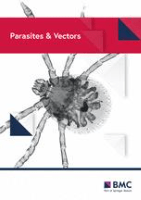
Parasites & Vectors
Innovating research to combat vector-borne pathogens.Parasites & Vectors is a leading open access journal dedicated to the dissemination of high-quality research on the vectors of infectious diseases and their parasitic agents. Published by BMC in the United Kingdom, this journal has been at the forefront of its field since its establishment in 2008, contributing to our understanding of vector-borne pathogens through its rigorous peer-reviewed articles. With a notable impact factor and categorized in the top quartile (Q1) in both Infectious Diseases and Parasitology, it is an essential resource for researchers, professionals, and students worldwide. The journal ranks impressively within various categories, holding a position of 7th out of 194 in Veterinary General Veterinary and 12th out of 79 in Immunology and Microbiology Parasitology, indicating its significant contribution to the sciences. Accessible to all, Parasites & Vectors supports the global pursuit of knowledge in epidemiology and disease control, making it an indispensable platform for sharing innovative findings and fostering collaboration within the scientific community.
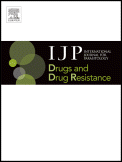
International Journal for Parasitology-Drugs and Drug Resistance
Exploring Therapeutic Frontiers in ParasitologyInternational Journal for Parasitology-Drugs and Drug Resistance, published by ELSEVIER SCI LTD, is a premier open access journal that has been at the forefront of parasitology research since its inception in 2011. With an impressive impact factor and recognition as a Q1 journal in multiple categories including Infectious Diseases, Parasitology, and Pharmacology, it serves as an essential resource for researchers, professionals, and students looking to advance their understanding of drug resistance and therapeutic strategies against parasitic infections. Based in the Netherlands, the journal’s scope encompasses a wide range of topics dedicated to innovative drug development, resistance mechanisms, and treatment efficacy, empowering the scientific community with high-quality, peer-reviewed articles. Engaging with this publication not only enhances the discourse on parasitological challenges but also contributes to the global fight against infectious diseases. With the adoption of open access since 2011, the journal ensures that valuable insights and knowledge remain readily accessible to all stakeholders in the field.

REVISTA BRASILEIRA DE PARASITOLOGIA VETERINARIA
Bridging Local Insights with Global Parasitology TrendsThe REVISTA BRASILEIRA DE PARASITOLOGIA VETERINARIA, published by the BRAZILIAN COLLEGE OF VETERINARY PARASITOLOGY, serves as a premier platform for disseminating groundbreaking research and advancements in the field of veterinary parasitology. Since its transition to Open Access in 2007, the journal has significantly contributed to fostering global collaboration and knowledge sharing among researchers and practitioners. Situated in Brazil, this esteemed journal features a diverse range of studies focused on the latest developments and challenges in veterinary and parasitological sciences. With a commendable Q3 ranking in Parasitology and Q2 ranking in Veterinary (miscellaneous) for 2023, it is recognized for its growing impact in the academic community, particularly holding positions in the 60th percentile for General Veterinary and 37th percentile in Parasitology. Researchers, professionals, and students interested in enriching their understanding of veterinary parasitology will find this journal a vital resource, as it bridges regional expertise with global research trends, thus embracing a holistic approach to veterinary health.

Parasite
Exploring the intricate world of parasites and their impacts.Parasite is a distinguished open-access journal published by EDP Sciences S A based in France, specializing in the multifaceted field of parasitology and related disciplines. Since its inception in 1994, it has played a pivotal role in advancing research in Agricultural and Biological Sciences, Animal Science and Zoology, Infectious Diseases, Insect Science, and Veterinary Sciences, earning a prominent place in the academic community with its 2023 rankings placing it in the Q1 category for several key areas. With an impact factor reflective of its quality and engagement, the journal fosters a collaborative environment for researchers, professionals, and students to disseminate and access high-quality studies and reviews. Operating under an open-access policy since 2013, Parasite ensures that cutting-edge research is accessible to a global audience, thereby promoting knowledge sharing and innovation in the field. For more information, please visit the journal's homepage and explore its extensive repository of articles that contribute to the understanding of parasitic interactions and their implications in health and agriculture.

Current Research in Parasitology & Vector-Borne Diseases
Bridging gaps between science and public health in parasitology.Current Research in Parasitology & Vector-Borne Diseases, published by ELSEVIER, is an influential journal dedicated to advancing the understanding of parasitology and vector-borne diseases. With an ISSN of 2667-114X, this journal is highly esteemed in the field, holding a prestigious Q1 quartile ranking in categories such as Animal Science and Zoology, Insect Science, and Parasitology, as well as a notable Q2 ranking in Virology for 2023. The journal's focus spans a crucial intersection of disciplines, offering a platform for innovative research that directly addresses global health challenges posed by parasites and vectors. Researchers benefit from its robust open-access model, which facilitates unrestricted dissemination of knowledge, making essential findings accessible to a wider audience. The journal continues to play a pivotal role in fostering scholarly dialogue and interdisciplinary collaboration within the scientific community, serving as a vital resource for professionals, students, and academicians interested in the dynamic and evolving field of parasitology.
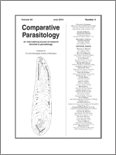
Comparative Parasitology
Advancing Knowledge in Ecology and ParasitologyComparative Parasitology, published by the Helminthological Society of Washington, serves as a vital platform for the dissemination of innovative research in the fields of parasitology, ecology, and evolution. With an ISSN of 1525-2647 and an E-ISSN of 1938-2952, this journal has charted a course of academic influence since its inception in 1996, and is set to continue until 2024. Although it currently holds a Q4 ranking in both Ecology, Evolution, Behavior and Systematics and Parasitology categories, it guarantees significant contributions and diverse studies, providing an essential resource for researchers and practitioners in these domains. Located in the United States and managed by Allen Press Inc, Comparative Parasitology emphasizes open access, ensuring that vital research findings are readily available to the global community. The journal remains dedicated to fostering an understanding of the complexities of host-parasite interactions and promoting interdisciplinary collaboration, making it a crucial resource for students and professionals alike.
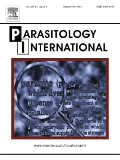
PARASITOLOGY INTERNATIONAL
Innovating Research in Parasitic PathologyParasitology International, published by Elsevier Ireland Ltd, is a leading journal in the field of parasitology and infectious diseases. With its ISSN 1383-5769 and E-ISSN 1873-0329, this esteemed journal provides a platform for the dissemination of high-quality research covering various aspects of parasitic diseases and their treatment. Recognized for its rigorous peer-review process, Parasitology International currently holds a commendable Q2 ranking in both the Infectious Diseases and Parasitology categories for 2023. The journal's Scopus rankings further enhance its reputation, positioning it at Rank #33/79 in Parasitology and Rank #166/344 in Infectious Diseases. Covering a broad range of topics from host-parasite interactions to novel treatments, this journal plays a pivotal role in advancing knowledge and fostering innovation within the research community. Though it does not currently operate as an open access journal, it continues to attract contributions from leading experts around the world, making it an invaluable resource for researchers, professionals, and students committed to understanding and combating parasitic diseases.
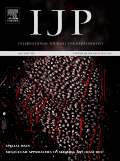
INTERNATIONAL JOURNAL FOR PARASITOLOGY
Fostering Academic Excellence in Parasitology StudiesInternational Journal for Parasitology, published by Elsevier Sci Ltd, stands as a premier platform for disseminating groundbreaking research in the fields of parasitology and infectious diseases. With an impressive impact factor represented by its Q1 quartile rankings in both Infectious Diseases and Parasitology for 2023, this journal commands significant attention within the scientific community. Operating since 1971, it has profoundly contributed to the understanding of parasitic infections and their implications for human health, occupying a distinguished position ranked #7 out of 79 in Parasitology and #64 out of 344 in Infectious Diseases according to Scopus metrics. Although the journal currently does not offer open access options, it ensures rigorous peer review and unparalleled academic integrity, providing researchers, professionals, and students with critical insights necessary for advancing knowledge and fostering innovations in parasitology. Together with its rich historical foundation and commitment to excellence, the journal is indispensable for anyone delving into the complexities of parasites and their impact on both host and ecosystem.

SYSTEMATIC PARASITOLOGY
Advancing the frontiers of parasitological research.SYSTEMATIC PARASITOLOGY, a premier academic journal published by Springer, serves as a vital resource in the field of parasitology. Since its inception in 1979, this journal has committed itself to advancing the understanding of parasitic organisms and their interactions with hosts, thus playing a significant role in both basic and applied research. With an impactful contribution to the scientific community—evidenced by its Scopus ranking and its position in the third quartile (Q3) within the Parasitology category—the journal provides a platform for high-quality, peer-reviewed research that spans a variety of topics from molecular biology to ecology. Although not currently open access, SYSTEMATIC PARASITOLOGY remains essential for researchers, professionals, and students who seek to stay at the forefront of parasitological studies and contribute to ongoing developments in the domain. Published in the Netherlands, it continues to attract a diverse international readership, fostering a collaborative scientific environment.